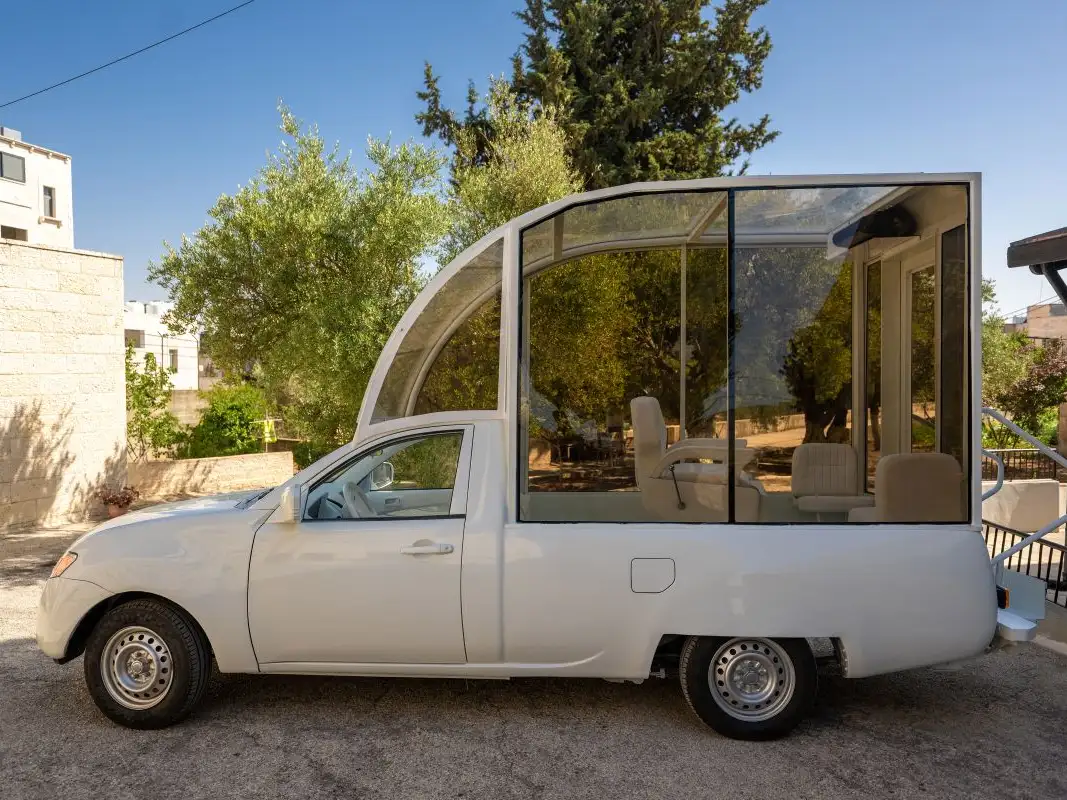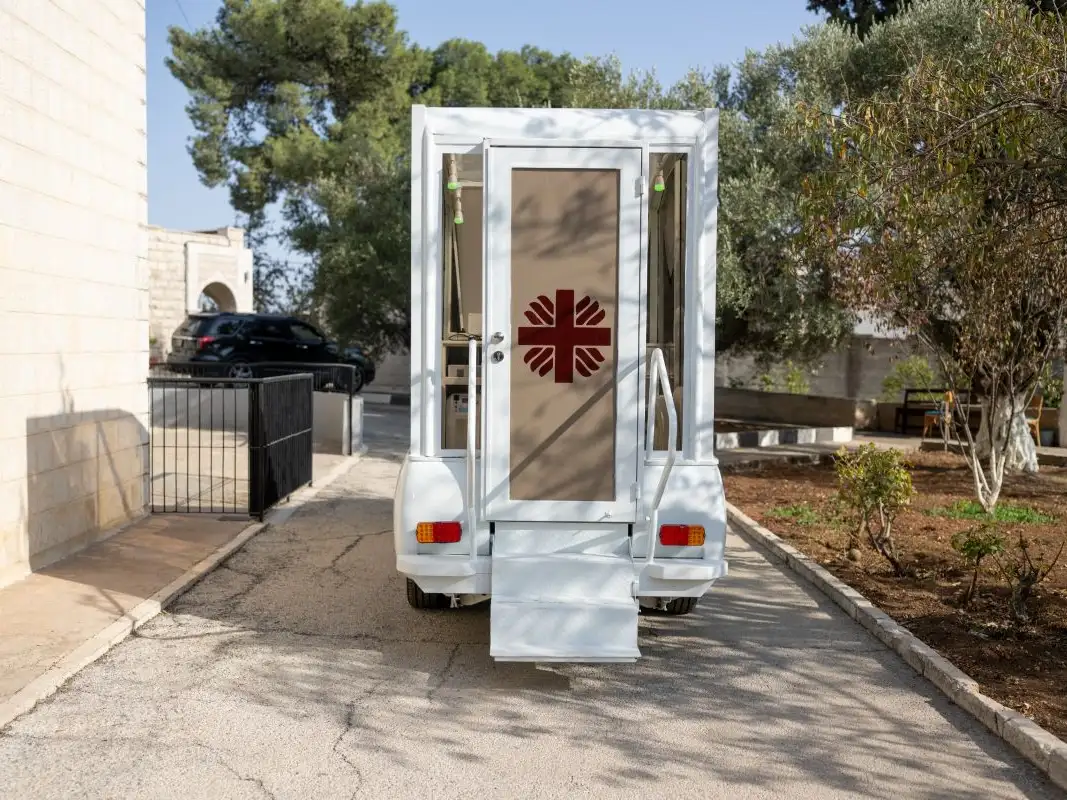Donate to the Middle East Humanitarian Appeal
Millions have fled their homes in search of safety. They urgently need shelter, food and basic supplies.


Credit: George Jaraiseh
This week Caritas has unveiled the 'Vehicle of Hope', the former Popemobile transformed into a mobile paediatric clinic designed to reach Gaza’s most vulnerable children, those living in areas where healthcare has broken down or become impossible to access.
In a letter welcoming the initiative, Pope Leo XIV wrote:
“It is my hope that this vehicle will continue to bring healing and compassion to children in conflict zones, particularly in Gaza. Its new mission reflects the love and solidarity embodied in Pope Francis’ legacy. I extend my Apostolic Blessing to all members, collaborators and friends of the initiative, as a pledge of joy and peace in the Lord.”
The launch of the Vehicle of Hope comes at a moment of extreme humanitarian strain. UN agencies estimate that more than 20,000 children have been killed since the escalation of the conflict, while tens of thousands more suffer from injuries, preventable diseases, malnutrition and severe psychological trauma.
Originally built by Mitsubishi, the vehicle has undergone a complete structural and medical refit. The chassis has been reinforced to handle damaged roads, while upgraded suspension and high-resistance tires allow medical teams to reach areas inaccessible to standard ambulances.
Inside, the clinic provides a medical workspace, including a triage and examination area equipped for trauma stabilisation, post-amputation care and emergency paediatric treatment. Refrigeration units, compliant with WHO’s vaccine-storage standards, allow safe transport of insulin, vaccines and paediatric antibiotics. The vehicle’s independent power system, supported by a backup battery bank, enables 6–8 hours of off-grid operation.
The vehicle once carried Pope Francis during his visit to Bethlehem. In early 2025, he personally approved its conversion into a humanitarian instrument, writing to Cardinal Anders Arborelius of Stockholm to authorize the project. Guided by that decision, the Vehicle of Hope has been rebuilt as a paediatric mobile clinic delivering lifesaving care to children displaced and injured by the war. With hospitals in ruins and access gravely limited, the vehicle provides not only medical treatment but a vital symbol of hope.
“I am deeply grateful for the encounters with people of goodwill here in the Holy Land,” said Cardinal Anders Arborelius, Bishop of Stockholm and one of the initiators of the project. “In times like these, signs of hope are urgently needed. I am convinced that this converted Popemobile can truly serve its purpose, namely a practical tool for humanitarian workers, and a genuine vehicle of hope for those who need it most.”
Rebuilt in collaboration with engineers and paediatric medical specialists, the Vehicle of Hope is designed to operate where roads are damaged, access is limited and health infrastructure no longer functions.
“This is not just a medical intervention, it is our moral responsibility in the face of an unfolding catastrophe,” said Anton Asfar, Secretary General of Caritas Jerusalem and head of the project. “Caritas Jerusalem has worked in Gaza for decades. The Vehicle of Hope is another step in easing the suffering of the most vulnerable, especially children. It will play a vital role in delivering qualified medical care, while also standing as a symbol of hope.”
More than 130 Caritas staff members continue to work inside Gaza, where the organisation operates five medical points and several mobile units that provide primary care, trauma treatment and psychosocial support. To strengthen this ongoing response, the Vehicle of Hope will operate in partnership with the Gaza Mobile Health Initiative, working alongside a coordinated network of more than ten mobile clinics. By combining their reach and resources, these teams create a lifeline for communities left without functioning health facilities, ensuring that displaced children and families can still be reached with essential care.
“We cannot wait for perfect conditions. Children cannot wait. This vehicle allows us to serve them where they are, not where it is convenient,” Asfar added.
Elizabeth Funnell, CAFOD country representative for the Middle East, said:
“The Popemobile is an extension of the love and solidarity that Pope Francis showed. It is also a way of reminding us that the needs in Gaza are still huge. The Popemobile, like a lot of aid, is not in Gaza at the moment. We’re not sure when it will be able to enter and fulfil those wishes of Pope Francis.
“We know that millions of pounds worth of aid remains stuck in warehouses rather than reaching the people that need it. We’re hearing from people on the ground that there have been small improvements. Given the scale of the destruction and the scale of need, most things – such as basic food items – are still out of reach for ordinary people.
“Our local partner, like Caritas Jerusalem, is still operating on the ground in around ten medical points across Gaza. When access becomes available for the Vehicle of Hope, it will be put to extremely good use.”


Credit: George Jaraiseh
For more information or interview requests, please contact:
Rosalind Mayfield, CAFOD Media Officer
Melissa Nethersole, CAFOD Media Officer
CAFOD’s out-of-hours media line
CAFOD is the official aid agency of the Catholic Church in England and Wales, and part of Caritas Internationalis, working with communities across Africa, Asia, the Middle East and Latin America to fight poverty and injustice, including those worst hit by climate change. The agency works with people in need, regardless of race, gender, religion or nationality.
Millions have fled their homes in search of safety. They urgently need shelter, food and basic supplies.
A prayer seeking God's help for the situation in the Middle East.